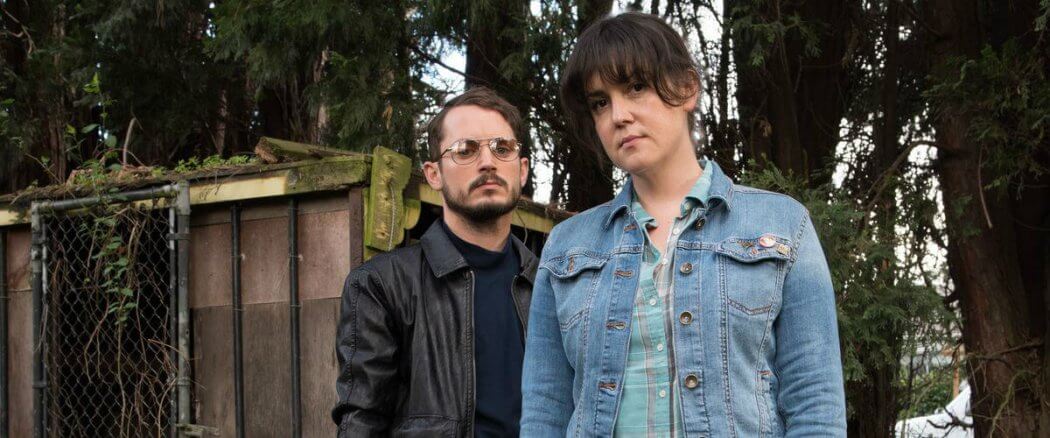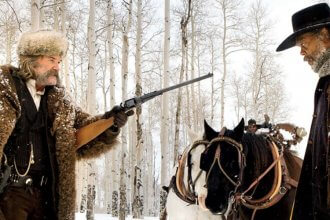For just a second, I want you to think back on the last time you were out in public and felt annoyed by a total stranger.
Didn’t take long, did it? We all know these aren’t isolated experiences, but sometimes it feels like the world goes out of its way to send especially obnoxious people into our lives: bad drivers; loud talkers; inattentive parents; etc. After so long, it can start to feel like you’re lost in one aloof crowd, the only sane person for miles in each direction.
If you’ve never felt like that, I can point you to one person who does: Melanie Lynskey’s Ruth, a woman perpetually targeted in a sea of degenerates in the new Netflix film I Don’t Feel at Home in This World Anymore. The mid-30s nurse is privy to a barrage of mundane horrors. From a patient’s racist final ramblings to her neighbor’s dog continuously defecating in her front yard, Ruth lives her life as a doormat… at least until her house is robbed. That’s when Ruth finally puts her foot down, ready to show mankind that she won’t put up with its crap anymore.
A Life of Solitude
It would be impossible to talk about Netflix’s Sundance hit — and Grand Jury prize winner — without highlighting Lynskey’s performance as Ruth. Lynskey has long been an admired, under-the-radar performer known for her cutesy charm and charisma. She’s perfectly cast as the non-confrontational Ruth, carrying a sense of innocence throughout the film. It may seem inconsequential at times, but the movie would suffer mightily without Lynskey’s performance.
 Ruth’s routine probably looks similar to many of ours: traffic, work, grocery store, crack a cold beer at the end of the day. And while her fellow man seems more than content to walk all over her, the burglary sets her over the edge. Her mission is set: show the world why people must be kind to one another.
Ruth’s routine probably looks similar to many of ours: traffic, work, grocery store, crack a cold beer at the end of the day. And while her fellow man seems more than content to walk all over her, the burglary sets her over the edge. Her mission is set: show the world why people must be kind to one another.
Writer/director Macon Blair isn’t as concerned with Ruth’s motivations though. In fact, when she’s later asked why she goes to such trouble to confront her offender, she doesn’t have much of a response. Her innocent morality seems flimsy and unsatisfactory. And it is.
However, Ruth’s interactions tell a different story. At the start of the film, Ruth seems to only have one friend, a married woman who also acts as Ruth’s therapist. When she’s not listening to Ruth’s oddly philosophical ramblings, she’s letting her swear at her daughter and sleep on the family couch. Despite her desire for a warmer world, Ruth never seeks to be the change, only to witness it. She has no experience investing in others, only taking from them. In no instance is that clearer than her relationship with Tony.
Opposites Attract
Elijah Wood’s Tony seems solitary like Ruth, but that’s about where the similarities end. Ruth wears jeans and baseball tees; Tony rocks tank tops and knee-high socks. Ruth goes to bars; Tony practices martial arts. Ruth has her grandma’s silver; Tony has a throwing star and a rat tail.
 The unlikely pair — along with Tony’s dog, Kevin — form a not-so-odd couple that’s easy to root for in more ways than one. Sure, you want to see them find the burglar and survive the encounters to follow. But you also want them to work out, even if not romantically. Both are desperately in need of a friend of any sort. And Wood’s zany spice works so well with Lynskey’s sugar-sweetness, I spent more of the film thinking about their relationship and less about the central conflict. That’s not to say the story is bland — it’s not. But Blair has crafted one of the more interesting movie friendships I can remember in recent years. That alone is worth the run time of the film.
The unlikely pair — along with Tony’s dog, Kevin — form a not-so-odd couple that’s easy to root for in more ways than one. Sure, you want to see them find the burglar and survive the encounters to follow. But you also want them to work out, even if not romantically. Both are desperately in need of a friend of any sort. And Wood’s zany spice works so well with Lynskey’s sugar-sweetness, I spent more of the film thinking about their relationship and less about the central conflict. That’s not to say the story is bland — it’s not. But Blair has crafted one of the more interesting movie friendships I can remember in recent years. That alone is worth the run time of the film.
But Tony and Ruth aren’t the only opposites that attract in I Don’t Feel at Home in This World Anymore. Blair’s script also strikes a balance between black comedy and bubbly naivety that’s so unique, it genuinely unsettled me. It’s categorized as a drama, comedy, and thriller depending on where you look. It certainly has elements of each, but it doesn’t fit quite into any. Some critics will argue, “The film doesn’t know what it is,” but that couldn’t be further from the truth. Instead, it comfortably rests in the margins, exploring character and interaction in lieu of headier themes. Yes, it’s hilarious and nerve-racking, but those are just byproducts of the strange people inhabiting Blair’s world.
Looking for Home
The film’s title comes from an old hymn, “This World is Not My Home.” It goes:
This world is not my home
I’m just a passin through
My treasures are laid up
Somewhere beyond the blue
It calls to mind Christ’s words in Matthew 6: “Store up for yourselves treasures in heaven.” And while Tony is a church-goer, spirituality doesn’t play a large role in the narrative. Ruth isn’t particularly religious herself, though she does show a curiosity to Christianity throughout. In the end, the film never really addresses where home is, even if it shows a keen recognition of our fallen nature.
The film’s central conceit is still correct, though: this world is not our home. That much is made clear throughout all the crazy antics and characters populating the film. Who could feel at home in such a brutal, surreal place? It’s a messy world filled with messy people.
But there’s something deeply spiritual about the way relationships are glorified in Blair’s movie. Everyone needs friends, and those without always seem to be on the verge of collapse.
Without spoiling the film’s climax, I will say that Ruth learns she can’t change humanity. However, she can find people whom she can give love. It’s a simple, but timeless lesson made all the more rewarding by the sincere, singular vision of Blair’s filmmaking.
In Mark, Jesus says, “Love your neighbor as yourself.” There are plenty of movies out there about neighbors. I Don’t Feel at Home in This World Anymore might follow the words of Jesus more genuinely than any predecessors, even when it doesn’t quite mean to.





